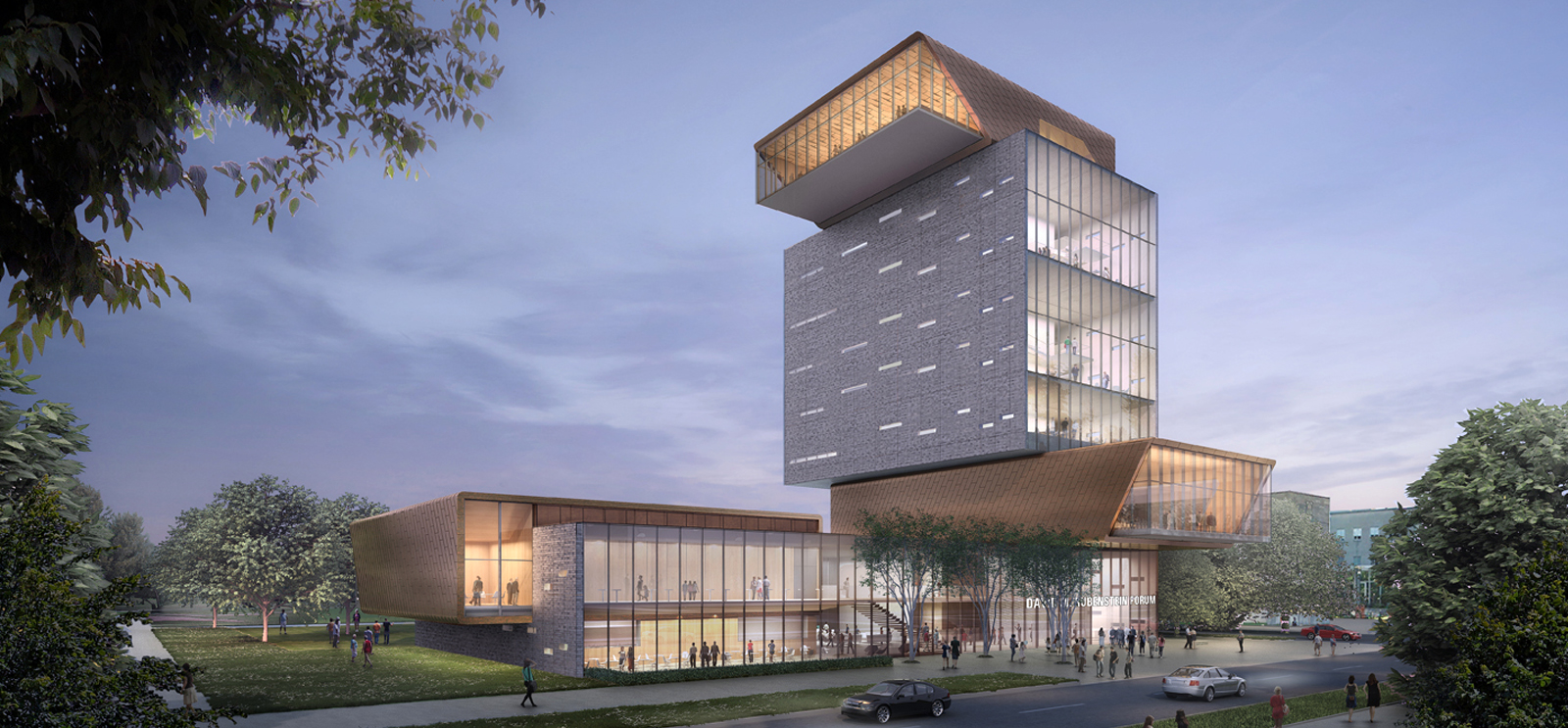
Architect’s rendering of the Rubinstein Forum. (University of Chicago News Office)
A selection of the latest headlines from UChicago.
Peopling The Pearson Institute
Political scientist and economist James A. Robinson, University Professor at Chicago Harris, has been chosen as the inaugural faculty director of The Pearson Institute for the Study and Resolution of Global Conflicts at the University of Chicago. In addition, two new faculty members have received named professorships at The Pearson Institute.
Chris Blattman, the Ramalee E. Pearson Professor of Global Conflict Studies, focuses on poverty and violence reduction in developing countries. Oeindrila Dube, the Philip K. Pearson Professor of Global Conflict Studies, is a scholar of the political economy of conflict and development. The Pearson Institute launched this July.
Tackling development challenges
Chicago Harris has partnered with India’s Tata Trusts to launch the Tata Centre for Development at UChicago. The collaborative center will investigate economic and social development challenges in India with an initial focus on health, water and sanitation, and energy and the environment. A pilot program in partnership with the State of Karnataka in southwest India aims to improve access to and usage of health insurance across the state.
New appointees
Sian Block, Melissa Gilliam, and Melina Hale, PhD’98, have been named to leadership positions in the Office of the Provost. As executive vice provost, Beilock, the Stella M. Rowley Professor in Psychology, will lead strategic initiatives that ensure the University’s preeminence and distinction (see On the Agenda).
Gilliam, a professor in obstetrics/gynecology and pediatrics, has been named vice provost for academic leadership, advancement, and diversity, and will oversee the development of scholars throughout their academic careers and ensure that the University continues to build a diverse pipeline of scholars. Hale, professor in organismal biology and anatomy, will take the position of vice provost for academic initiatives, with responsibility for development of key academic initiatives that span departments and divisions.
Second term for Terrell
Matthew Terrell, the Pritzker Director and dean of the faculty of the Institute for Molecular Engineering, began his second five-year term in that role July 1.
Tirrell is the founding director of the institute, which translates advances in basic physics, chemistry, biology, and computation into new tools to address important societal problems. Since Tirrell’s arrival in 2011, the institute has attracted 15 faculty members and launched a graduate program. The first class of 30 undergraduate molecular engineering majors will graduate in 2018.
Full houses
When the College’s Campus North Residential Commons opens this fall, its eight new house names will honor University alumni, supporters, and dean of the College John W. Boyer, AM’69, PhD’75. To name the John and Barbara Boyer House in honor of the longtime dean and his wife, 60 current and former members of the Visiting Committee on the College and Sudent Activities made gifts to the Metcalf Internship and Odyssey Scholarship programs.
Like Boyer House, Dr. Robert A. Behar House, Brady W. Dougan and Laura E. Niklason House, Rogers Family House, Alexis and Steven Strongin House, Immanuel Thangaraj House, Tina and Byron Trott House, and Francis and Rose Yuen House will each be home to about 100 undergrads.
Daring design
New York–based architecture firm Diller Scofidio + Renfro has unveiled the design for the Rubenstein Forum, a 90,000-square-foot building for major events and scholarly collaboration that will be located at the southeast corner of Woodlawn Avenue and 60th Street. The design features a two-story base and 165-foot tower. The building’s largest meeting space, tentatively named the University Room, will accommodate up to 600.
Big data
The Genomic Data Commons, a new digital platform for sharing cancer genomic data and clinical information, launched June 6 with approximately 4.1 petabytes of data from National Cancer Institute–supported research programs. That day, vice president Joe Biden toured the GDC’s UChicago-based operations center. The GDC allows cancer researchers to access and share data with the research community, advancing studies to understand cancer and develop personalized patient treatment.
Space for artists
With the help of community partners, the University aims to develop a stretch of historic East Garfield Boulevard into a major arts and culture corridor called the Arts Block. The Arts Block will expand on the success of the University’s Arts Incubator on East Garfield, as well as efforts to convert vacant spaces along the street into artist studios, performance and exhibition venues, retail stores, and spaces for public events and education programs. Theaster Gates, professor in visual arts, is leading the project.
Top teachers
Daniel McGehee, associate professor of anesthesia and critical care; Derek Neal, professor of economics; Emily Lynn Osborn, associate professor of history; Malte Willer, assistant professor of philosophy; and Sarah Ziesler, senior lecturer of mathematics, have received the Llewellyn John and Harriet Manchester Quantrell Awards for their undergraduate teaching. For their work with graduate students, Charles Cohen, the Mary L. Block Professor of Art History; Nicholas Hatsopoulos, professor of organismal biology and anatomy; Heinrich Jaeger, the William J. Friedman and Alicia Townsend Professor of Physics; Heather Keenleyside, AM’03, PhD’08, assistant professor of English; and Linda Zerilli, the Charles E. Merriam Distinguished Service Professor of Political Science, have received the 2016 Faculty Award for Excellence in Graduate Teaching and Mentoring.
